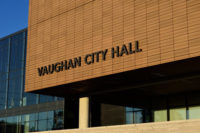Management Systems are the foundation of an organization’s
environmental program. ISO 14001:2015 has been released,
is your organization prepared to transition?

In 2019, Tavares Group Consulting Inc. (TGC) was engaged by the City of Vaughan to conduct a feasibility study for development and implementation of an Environmental Management System (EMS) for the Wastewater (WW) and Stormwater (SW) division. The EMS project consisted of three parts: a Management System (MS) Scan, Gap Analysis, and customized Implementation Schedule and Cost Estimate.
Management System (MS) Scan
An MS Scan of similarly-sized municipalities that have developed an Environmental or Quality Management System (EMS/QMS) for WW and SW operations was researched and documented. The scan detailed the benefits, challenges, opportunities, lessons learned, and costs associated with their MS.
Top 3 Reasons to Implement an MS for WW and SW
Top 3 Challenges to Implementing an MS for WW and SW
Based on the Scan Report, TGC provided the City with an implementation plan (confirmed by the gap analysis), an estimated timeline, and other specific recommendations.
When asked about the importance of an environmental management system for Vaughan Wastewater and Stormwater, and how might an EMS be advantageous for other municipalities, Saad Yousaf, City of Vaughan Storm Drainage Engineer and Project Manager, agreed,
“Environmental management system are vital for effective and efficient operations of wastewater and stormwater infrastructure. EMS can be advantageous for other municipalities to keep up with the current and increased legislation requirements by the province. The records can also be used for investigation purpose if required.”
Gap Analysis
TGC conducted a Gap Analysis between existing WW and SW practices compared ISO 14001: 2015 and the Drinking Water Quality Management Standard (DWQMS) already implemented in the department, including both off-site and on-site document reviews. Based on the Gap Analysis, TGC found that there is a benefit to integrating DWQMS (or other MS standards) and EMS programs to streamline processes and minimise documentation and associated control. This can be achieved via a two-phased implementation where established processes (e.g., corrective action) can be modified to incorporate the environment leaving those requiring approval (ISO 14001:2015 training, undertaking an Environmental Compliance audit, etc.) to follow, ensuring maximum (including cost) efficiency and continual improvement.
Implementing an ISO 14001:2015 EMS increases the value of the system and improves risk assessment in relation to interested parties/stakeholder and external/internal issues, including external environmental conditions, aspect identification, setting of objectives and targets, and more. ISO 14001:2015 allows a more complete look at the environment rather than focusing on localized operational issues, such as maintenance.
“[The] City has received the final feasibility report from Tavares Group Consulting and will plan to initiate the implementation subject to senior management approval,” said Saad Yousaf at the completion of the project. “Tavares Group Consulting did an excellent job for Vaughan and have met the timelines and scope of a feasibility study within the allocated budget.”
Implementation Schedule and Cost Estimate
Tavares Group Consulting Inc. develops customized implementation schedules and cost estimates based on the scope and scale of each project in order to ensure successful implementation and effective integration with existing processes. To learn how we can help elevate your EMS, contact us today!